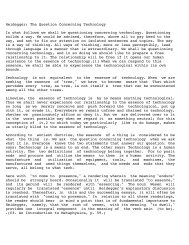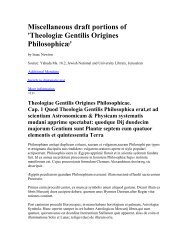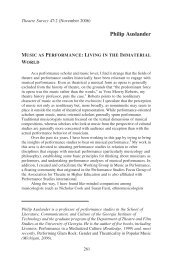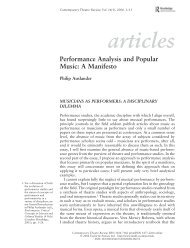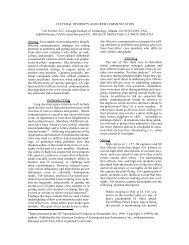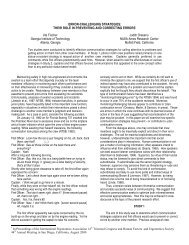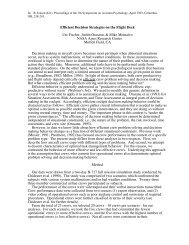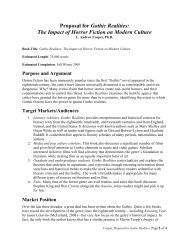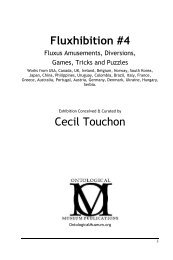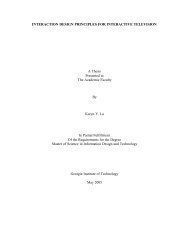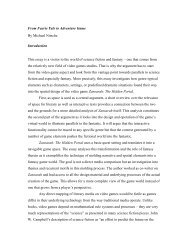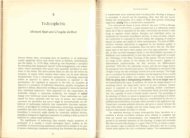william t. costello, sj - The School of Literature, Communication, and ...
william t. costello, sj - The School of Literature, Communication, and ...
william t. costello, sj - The School of Literature, Communication, and ...
Create successful ePaper yourself
Turn your PDF publications into a flip-book with our unique Google optimized e-Paper software.
THE FRAMEWORK OF SCHOLASTICISM 23<br />
Natural liberty, say the philosophers, is to live as one pleases [the<br />
date, be it noted, is pre-Hobbsian] .<br />
But this liberty is bridled by the threat <strong>of</strong> punishment<br />
<strong>The</strong>refore, the threat <strong>of</strong> punishment is a bridle <strong>of</strong> natural liberty.<br />
<strong>The</strong> syllogism has substance <strong>and</strong> Boyes has to distinguish the<br />
major premise. "I confess/' he says, "that it puts a bridle on corrupt<br />
nature, but we are not disputing about that. I am talking<br />
about natura Integra et incorrupta [human nature before the fall<br />
<strong>of</strong> man] as being in need <strong>of</strong> your bridle. <strong>The</strong> good hate sin out<br />
<strong>of</strong> the love <strong>of</strong> virtue. <strong>The</strong> evil hate it out <strong>of</strong> fear <strong>of</strong> pain."<br />
a dis-<br />
Boyes has just made use <strong>of</strong> his prerogative <strong>of</strong> explaining<br />
tinction. Sometimes, the answerer on his own initiative expounded<br />
the meaning <strong>of</strong> his distinction; sometimes, the moderator (never<br />
the opponent) would interject, "Explica!" if he thought the an-<br />
swerer was using an unusual distinction or one he (the answerer)<br />
did not underst<strong>and</strong>.<br />
But Boyes's opponent is a bulldog <strong>and</strong> \frill not be shaken <strong>of</strong>f<br />
by a distinction on the various states <strong>of</strong> nature. He presses Boyes,<br />
affirming that any nature, corrupt or incorrupt, has appetites,<br />
<strong>and</strong> is, therefore, in need <strong>of</strong> bridle. Boyes blocks the punch by<br />
admitting that, "although there is no nature entirely lacking in<br />
appetite, still there are in human society those sterling characters<br />
who are strengthened in innate virtue by fear <strong>of</strong> punishment."<br />
<strong>The</strong> opponent sees an opening <strong>and</strong> pounces: "<strong>The</strong>refore, the<br />
good do not hate sin for fear <strong>of</strong> punishment!" "Nego argumentum,"<br />
says Boyes.<br />
Boyes is now getting into difficulty, for the neat syllogism at h<strong>and</strong>.<br />
opponent has a<br />
Where several causes concur in an effect, the effect cannot be<br />
attributed to any one in particular.<br />
But in all virtuous actions several causes concur.<br />
<strong>The</strong>refore, in these actions the effect cannot be attributed to any<br />
one in particular [i.e., to fear <strong>of</strong> punishment].<br />
Boyes is being closed in. "But neither do I affirm," he says, "that<br />
virtue is to be attributed to a single cause."<br />
"<strong>The</strong>refore," the opponent immediately shoots back, "in human<br />
affairs the threat <strong>of</strong> punishment does not suffice."<br />
Boyes clinches with a "Nego argumentum" (another denial <strong>of</strong><br />
a subsumed premise, that is, a statement for which pro<strong>of</strong> will be<br />
<strong>of</strong>fered). <strong>The</strong> opponent hits with another enthymeme: "Besides<br />
the threat <strong>of</strong> punishment, natural goodness is required. <strong>The</strong>re-



